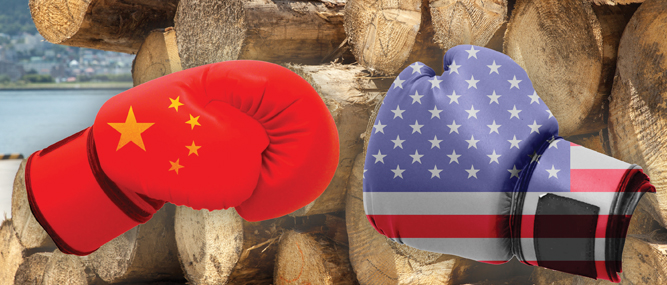The trade wars between the United States and other major trading partners has hit the forest products sector with a thud as China announced its most recent tariff targets. On August 3rd, the Chinese Ministry of Commerce released a proposal for tariffs ranging from 5% to 25% on various goods including hardwood lumber and logs.
The duties would equally cover both low-grade and grade hardwood logs and lumber. However, the impact would be far greater on the grade side since the vast majority of U.S. hardwood exports to China is grade material.
China’s proposal comes after the United States has indicated it will impose three rounds of tariffs on Chinese goods. The third and final round that coincides with the Chinese response impacting hardwood exports is projected to take effect in early October. China likely will respond with its response almost immediately.
Dana Lee Cole, the executive director of the Hardwood Federation, commented, “Everybody is very concerned and a lot of sectors are feeling the pain including the automotive, equipment, agriculture, chemical, plastics and wood products sectors, just to name a few.”
The hardwood sector is lobbying Congress to try to get some help. But these decisions firmly stand with the executive branch, and President Trump seems resolute to follow through on campaign pledges to get tough with trading partners. Cole explained, “The Trump administration is focused on this approach and is not willing to make concessions. The Chinese are digging in their heels too.”
Pressure from American companies that do business in China could force the Trump administration to broker a trade deal. The Hardwood Federation, The National Hardwood Lumber Association and other industry trade associations are encouraging hardwood companies and their employees to communicate to Congress the adverse impact that Chinese tariffs would have on the export business. If you have a particular view on this topic, you can contact your member of Congress via this Web link: https://www.votervoice.net/THF/campaigns/60209/respond.
The total value of U.S. Chinese imports covered by tariffs so far is about $500 billion, and the Chinese don’t have that much American goods to levy duties on. As a result, the Chinese are getting creative by canceling orders of American goods, restricting bank loans for transactions involving U.S. companies and other practices.
The proposed tariffs on hardwood lumber would levy the following duty rates (Source AHMI):
Hardwood logs…20%
Oak lumber…25%
Cherry lumber…20%
Ash lumber…20%
Other non-coniferous lumber…20%
Maple lumber…5%
Poplar lumber…5%
Other hardwood lumber…5%
Currently, U.S. hardwoods amount to about 10% of Chinese imports, according the American Hardwood Export Council (AHEC). Last year, shipments to China included US$1.6 billion in hardwood lumber, US$800 million for hardwood logs and US$260 million for veneer.
Michael Snow, executive director of AHEC, recently told Bloomberg that the hardwood sector was already facing head-winds as some Chinese furniture factories have closed due to new environmental standards. Now the trade duties are making a tougher market far worse, according to Snow. He said, “This could be, I don’t want to say ‘catastrophic,’ but very, very painful for the industry.”
Earlier in the summer, U.S. hardwood exports faced new fumigation requirements after the Chinese government claimed it had intersected shipments from the U.S. infested with invasive pests. Treatment cost according to these new policies are in some cases cost prohibitive and lacks an adequate treatment capacity.
All of these factors are leading to hardwood exports to China dropping, according to the Hardwood Federation. In a recent survey of major hardwood exporters, respondents claimed that orders from China had dropped 30-60% just because of the threat of a tariff.
Where will China go for the material it needs since it has limited its domestic timber harvesting? The answer is likely Russia and some other nearby countries.
Cole of the Hardwood Federation explained, “China probably has more new suppliers in hardwoods than we have in new markets.” She added that some hardwood producers are worried about long-term market realignment if the tariffs remain in place for a while.





